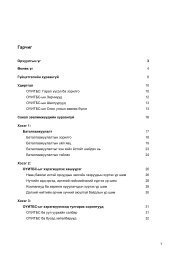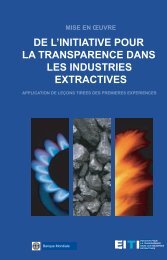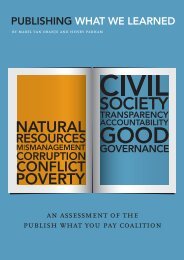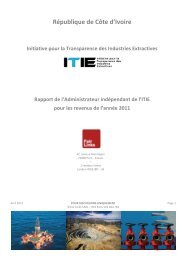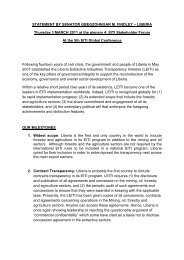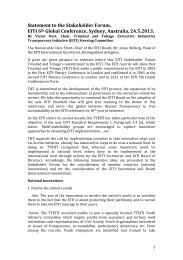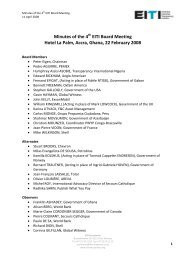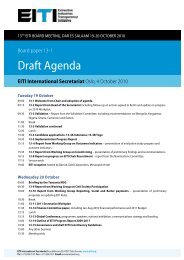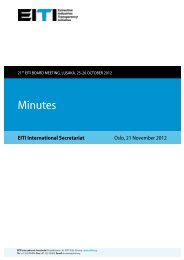Second National Reconcilation Study EITI Peru - unofficial…
Second National Reconcilation Study EITI Peru - unofficial…
Second National Reconcilation Study EITI Peru - unofficial…
You also want an ePaper? Increase the reach of your titles
YUMPU automatically turns print PDFs into web optimized ePapers that Google loves.
Consultoría para la Elaboración del Segundo Estudio Nacional de<br />
Conciliación de la Iniciativa de Transparencia para las Industrias<br />
Extractivas (ITIE) en el Perú (2008 – 2010) (continuación)<br />
Any intervention limited in time implying the application of public resource to expand, improve and upgrade the<br />
capacity to produce goods or provide services, the benefits of which are independent from those of other projects<br />
Public Treasury<br />
The public assets managed by the Central Government. Revenues of the Public Treasury proceed from the<br />
application of taxes, charges, contributions, property revenues, fines and other penalties, etc. Also known as the<br />
Exchequer.<br />
Refinery<br />
Industrial facility where Oil, natural gasolines or other hydrocarbon sources are converted to Liquid Fuel. May<br />
include diverse products such as Lubricants, Asphalt, Tar, solvents, etc.<br />
Regional Government<br />
The Temporary Regional Administration Councils (Consejos Transitorios de Administración Regional)<br />
(Departmental CTARs according to Law No. 26922). CTARs are politically, economically and administratively<br />
autonomous in matters under their competence and are in charge, within their jurisdiction, of coordinating and<br />
implementing regional socio-economic plans, as well as of managing activities and services to be performed by<br />
the government according to law. Assets and Revenues owned by the Regions are established by law. Regions<br />
provide support to Local Governments but do not substitute them or duplicate their actions or competence.<br />
Resident Person<br />
Any person, whether an individual or legal entity, registered in the tax registers of the country where such person<br />
operates.<br />
Revenue collection<br />
The process of collecting revenues, whereby the government receives public resources from taxes, without<br />
generating any obligation in return.<br />
Royalty<br />
A monetary amount that a concession holder or operator of a prospecting operation or a mining property pays at<br />
regular intervals to the landowner. Usually based on a certain amount per tonne or a percentage of the total<br />
production or the earnings. Also, a fee paid for the right to use a proprietary process.<br />
Single Taxpayer Registry (Registro Único de Contribuyentes or RUC)<br />
The <strong>National</strong> Tax Administration Superintendence Register containing information on every individual or legal<br />
entity, undivided estate, de facto partnership or collective entity, whether <strong>Peru</strong>vian or foreign and whether or not<br />
residing in <strong>Peru</strong> that, under applicable laws is a taxpayer and/or liable for taxes managed by SUNAT.<br />
SUNAT<br />
The <strong>National</strong> Tax Administration Superintendence is a decentralised Public Entity of the Economy and Finance<br />
Sector organised as a Public Law legal entity, with its own assets and financial, administrative, functional and<br />
technical autonomy, whose role is to manage, monitor and collect internal revenue taxes and levies (including<br />
Income Tax and mining royalties) other than municipal taxes, and perform the same duties in connection with<br />
contributions to the <strong>Peru</strong>vian Social Security (ESSALUD) and the Pension Standardising Office (ONP)<br />
Consultoría para la Comisión Multisectorial Permanente de la ITIE Perú<br />
204



